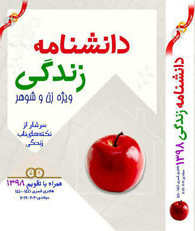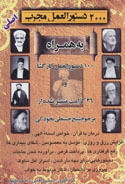کلیپ های دیدنی
مشاوره و خانواده
با توجه به ترک خود ارضایی عوارض آن هنوز در من هست چگونه آن را برطرف کنم ؟
13-08-1399 بازدید:5700 مباحث جنسی و زناشویی همکار پاسخگو

آیا بخاطر وسواس فکری توهین به مقدسات گناه دارد؟
19-05-1398 بازدید:5399 مشکلات و اختلالات روانی همکار پاسخگو
آیا از طریق اینترنت می تواند ازدواج موقت کرد ؟
پرسش: با سلام من 22 سالمه از پارسال با يه دختري در…
از زندگی سیر شدم و آرامش ندارم چکار کنم؟
پرسش : سلام..خواهش ميکنم يه راهي جلو روم بذارين من از…
من از تاریکی شب به دلیل توهمات ذهنیم میترسم چکار کنم؟
پرسش: من وقتي در خانه تنها مي شوم و هوا تاريك…
شب ها كابوس فيلم هاي مبتذل را که قبلا نگاه می کردم میبینم!
پرسش: (در خصوص توبه از ديدن فيلم هاي مبتذل) در اين…
بنده متاهلم و در اینترنت با دختری آشنا شدم که کارمون به گناه کشید!
پرسش: بنده یک مشکلی دارم که می خواستم از شما راهنمایی بخواهم…
جوانی هستم که از زندگی خسته شده و احساس پوچی می کنم!
پرسش: راستش نمی دانم از کجا شروع کنم. 20 ساله هستم…
از طریق اینترنت با پسری آشنا شدم و مدتها با هم در ارتباط بودیم!
پرسش:من دانشجوی ارشد رشته حقوق تقریبا حدود 1 سال پیش…
چرا خانواده ها عاشق شدن را برای جوانان (دختر) بد می دانند؟
پرسش: چرا خانواده ها عاشق شدن را برای جوانان (دختر) بد…
چگونه دیدن فیلم های مبتذل را ترک کنم؟
پرسش: با سلام به حضور حضرت عالي اگرخاطرتان باشد ،من قبلا هم…
با شوهرم قبل از ازدواج رابطه نانشروع داشتم!
پرسش: با سلام من زنی 25 ساله هستم.حدود 1 سال است…
اگر دختری عاشق غیر هم جنس خود...؟
پرسش: اگر دختری عاشق غیر هم جنس خود شود البته نه…
اگر نتوانيم جلو شهوت خود را بگيريم ، چه بايد بكنيم ؟
پرسش: اگر نتوانيم جلو شهوت خود را بگيريم ، چه بايد…
جوانی هستم 21 ساله اهل تهران و تمایل زیادی به سکس دارم
پرسش: من جوانی هستم21 ساله اهل تهران وتمایل زیادی به سکس…
نمي دونم چرا از ازدواج مي ترسم؟!
پرسش: سلام مشکل من اینه که نمي دونم چرا از ازدواج مي…
چرا به زن مطلقه با یک چشم و دید دیگری نگاه می کنند؟!!
پرسش: سلام حاج آقا من یک خانم مطلقه هستم و سوالم اینه…
چرا مخالف رابطه دختر و پسر هستید؟؟!!
پرسش: سلام حاجاقا چند تا سوال داشتم ممنون میشم جواب بدید. 1 چرا…
شب زفاف یا حجله چه شبی است و زن و مرد چکار باید بکنند؟
پرسش: شب زفاف و یا شب حجله که در روایات هم…
چه زمانی برای رابطه جنسی با همسر مناسب است؟
پرسش: چه زمانی برای رابطه جنسی با همسر مناسب است؟ و…
دختری که در سن جوانی و نوجوانی دچار شهوت می شود چه باید بکند؟
پرسش:دختری که درسن جوانی و نوجوانی دچار شهوت می شود…
می خواهم خوب باشم ولی دوست دخترم نمی گذارد!!
پرسش: به دلیل که من مدتی است به شهر آمده ام…
وقتی که عصبانی می شوم دیگر هیچ چیزی دست خودم نیست چکار کنم؟
پرسش: سلام آقای پاسخگو من دارای اخلاق بدی هستم وبا همه خواهر…
من دحتر قبلی نيستم و به يك دختر فاسد تبديل شده ام!
پرسش: من دختري هستم 14ساله من اول دختري سنگين بودم اما…
در مورد وسواسی و راه درمان آن توضیح بفرمایید؟
پرسش: وسواسی چیست و برای درمان آن چه راهکارهایی معرفی می…
خواسگارم بد اخلاق است آیا جواب مثبت بدهم؟
سوال: آیا به پسر بد اخلاق که خواستگاری کرده جواب مثبت…
اخلاقم رُك گفتن است اما حق ميگويم و شوهرم مخالف رفتارم است.
پرسش: اخلاقم رُك گفتن است اما حق ميگويم و شوهرم…
خواستگارم دو ازدواج و یک نامزدی ناموفق داشته جواب مثبت بدم؟
پرسش: خانمی هستم که در گذشته، یک ازدواج_ناموفق داشتم. در حال…
شوهرم گلایه میکنه که چرا همیشه به حرفم گوش میدی!
پرسش: من 20 سالمه 1 ساله ازدواج کردم شوهرم 22 سالشه…
دختر 36 ساله ای که چهره زیبایی ندارد چکار کند؟
پرسش: با سلامدختر 36 ساله اي که مومن و حافظ قرآن…
اختلاف سني پسر با دختر تا چه مقدار ايده آل است؟
پرسش: ميخواستم بدونم ايا ازدواج با دختري که سنش با پسر…
چگونه از انحرافات جنسى به دور باشيم؟
پرسش: در فاصله سنّ بلوغ تا هنگام ازدواج چگونه از انحرافات…
بعضی وقتا اعصابم میریزه بهم با نامزدم بدرفتار میکنم چطورخودمو کنترل کنم؟
پرسش: سلام ببخشید ی سوالی داششتم من دختری۱۸سالم ۷ماهه عقدکردم بعضی…
نقش خانواده در تربيت فرزندان چیست؟
پرسش: نقش خانواده در تربيت فرزندان چیست؟ پاسخ: با سلام و ادب خدمت شما…
نامزدم مي خواهد در كوچه و خيابان آرايش كرده و كمي از موهايم را از روسري بيرون بگذارم!
پرسش: من تا قبل از نامزديم بسيار با حجاب بودم. البته…
چرا برخی مردان در کنار همسرشان آرامش نمی یابند؟
پرسش: قرآن مجيد وجود زن را كانون محبّت و…
علت و شرايط تحقق صيغه چيست؟
پرسش: علت و شرايط تحقق صيغه چيست؟ پاسخ:…
چرا بین دو هوو همیشه اختلاف وجود دارد؟
پرسش: چرا بين دو همسر(زن) با وجود مشروعيّت ازدواج…
پرسش و پاسخ
آیا کسی که شراب بنوشد تا چهل روز نماز و عباداتش قابل قبول نیست ؟
13-08-1399 بازدید:2900 مسائل متفرقه نماز همکار پاسخگو

اذان در جامعه اسلامی نماد چیست ؟ و چرا فقط سه بار در روز تکرار می شود ؟
پرسش: اذان در جامعة اسلامی نماد چیست و…
حکم مشروبات الکلی از دیدگاه اسلام چیست ؟
پرسش: حکم مشروبات الکلی از دیدگاه اسلام چیست…
چرا با این همه ظلم و ستم در جهان امام زمان (عج) ظهور نمی کند ؟
پرسش: چرا با این همه ظلم و ستم…
اگر نگاه به نامحرم گناه است چرا در فیلمهای خارجی زنهای بدون حجاب را نشان میدهند؟
پرسش: چرا میگویند نگاه کردن به نامحرم گناه…

با چه شیوه هایی میتوانیم پیرو انبیاءالهی باشیم ؟
پرسش : چه راه و روشی را پیبگیریم…
چرا زرتشتیان به اعتقاداتشان پایبند هستند ولی مسلمانان نه؟
پرسش : چرا در دین زرتشت گفتار نیک،…
چرا معانی دقیق آیات قرآن مشخص نیست و نیاز به تفسیر دارد ؟
پرسش : به چه دلیل تا تفسیرهای متعدد…
آیا جهت انجام هر کار نامشروعی می توان صیغه جاری کرد ؟
پرسش : اهمیت صیغه کردن در چیست؟ با…
اگر پیامبر (ص) عرب زبان نبود آیا قرآن باز هم به زبان عربی نازل می شد؟
پرسش : اگر حضرت محمد(ص) زبان دیگری به…
آیا در بین پیامبران ،پیامبر خشن هم وجود دارد؟
پرسش : پیامبران به مهربانی معروف میباشند آیا…
با توجه به محاسن روزه آیا معایبی هم در آن هست ؟
پرسش : روزه محاسن بسیاری دارد، آیا این…
جنس خداوند از چه چیزی می باشد و خدا چیست؟
پرسش : جنس خداوند از چه چیزی میباشد…
معنی خدا چیست؟چرا خداوند از حروف دیگر استفاده نکرده است؟
پرسش : تعریف لغوی خدا چیست و چرا…
خال کوبی ابرو (تاتو )از نظر شرعی برای وضو و غسل چه حگمی دارد ؟
پرسش : خالکوبی ابرو (تاتو) از نظر شرعی…
شنیدن صدای زنان در مراسم عزاداری و مولودی چه حکمی دارد ؟
پرسش : شنیدن صدای زنان در مراسم عزاداری…
در چه صورتی امر به معروف و نهی از منکر واجب می شود؟
پرسش : در چه صورتی امر به معروف…
چرا در ایران مردی که از دین خود برگردد حکم اعدام را دارد ؟
پرسش: چرا در ایران مردی که از دین…
آیا ازدواج زن شیعه با مرد سنی اشکال دارد؟
پرسش : آیا ازدواج زن شیعه با مرد…
لمس آیات قرآنی که بر سنگ قبر نوشته شده است بدون وضو چه حکمی دارد ؟
برسش : لمس آیات قرآنی که بر سنگ…
فرق بین احتیاط واجب و احتیاط مستحب چیست؟
پرسش : فرق بین احتیاط واجب و احتیاط…

آیا با زیارت امامان و بوسیدن ضریح آنان انسان دچار شرک می شود؟
پرسش : آیا اعتقاد به این که شیعیان…

چرا در نماز از مهر استفاده میکنیم و فقط پیشانی بر خاک قرار می دهیم؟
پرسش : با توجه به این که هنگام…
آیا علائم هنگام ظهور امام زمان (عج) واقعیت دارد؟
پرسش : آیا وجود نشانههایی هنگام ظهور حضرت…
با وجود مساوات بین زن و مرد چرا مردان در اولویت قرار دارند؟
پرسش : با توجه به این که ما…
طریقه خواندن نماز در زمان رسول خدا (ص) چگونه بوده است؟
پرسش : طریقه نماز خواندن از زمان رسول…
چگونه می توانیم از گناه غیبت پرهیز کنیم؟
پرسش : چگونه میتوانیم از گناه غیبت پرهیز…
چگونه از بدخلقی و صفات زشتم دوری کنم؟
پرسش : چه راهی وجود دارد که انسان…
قطع رابطه با اعضای خانواده که از نظر شخصیتی و اجتماعی مشکل دارند گناه است؟
پرسش : آیا قطع رابطه با افراد خانواده…
آیا روح انسان بعد از مرگ در جسم دیگری دمیده می شود و دوباره به زندگی میکند؟
پرسش : آیا این نظریه درست است که…
اینکه در نماز کاهلی میکنم آیا در دینم خللی ایجاد می شود؟
پرسش : خدا را خیلی دوست دارم،همیشه در…
دلیل علاقه خاص به بعضی از امامان چیست؟
پرسش : چرا برخی برای بعضی امامان ارادات…
در شب اول قبر چه سوالاتی از ما پرسیده می شود ؟
پرسش : شب اوّل قبر چه سئوالاتی از…
آیا دوست داشتن یک نا محرم و ارتباط با او گناه است؟
پرسش : اگر کسی را واقعاً از صمیم قلب…
آیا ادعای ملاقات امام زمان (عج) از جانب برخی افراد صحت دارد ؟
پرسش : بر اساس روایتهای فراوانی امام زمان(عج)…
چرا به اصول و قواعد دین اسلام توجه نمی شود و پذیرش آن از سوی پیروان ادیان دیگر سخت است…
پرسش : دین اسلام کاملترین دینهاست و آسانترین…
آیا نظریه تناسخ از دیدگاه اسلام پذیرفته شده است ؟
پرسش : آیا نظریه تناسخ که بزرگان زیادی…
دست نوشته های طلبه پاسخگو

برای احترام به این ماه هم که شده این کار را انجام بده. مطمئن باش که یاد خدا باعث می شود که هیچوقت به سمت آن اشتباهات نروی.
برای همین یک ماه هم که شده از آن ها صرف نظر کرد و در ضیافت خدا شرکت بنما. بعد از این یک ماه، کیفیت زندگی ات را با گذشته مقایسه کن.
اگر بدتر شده بودی، دوباره به سمت آن گناهان و اشتباهات برو. ولی این ماه چنان عشقی به تو می دهد که دیگر زندگی ات به مانند گذشته نخواهد شد. این ماه خداوند تو را با عشق پذیرایی می کند.
Who Is Almighty Allah?
Who Is Almighty Allah?
There is no difference of opinion amongst Muslims that the Religion of Allah is Islam that the only way to know Islam is through the Book of Allah and the Sunnah of The Holy Prophet (pbuh&hf). The present article aims to deliver the opinion of Shia Islam concerning Almighty Allah briefly and proves that the Allah that Shia Muslims worship is the same Allah that The Glorious Quran and the Prophet introduced us to pray.
PERSON OF ALMIGHTY ALLAH
Sunni Muslims say that Allah has a body, not like the bodies we know. There is a vast material which can be quoted here describing that belief. But as all the Sunnis nowadays are Asharitc (followers of Abull-Hassan Al-Ash'ari), It would note down his belief on this subject. He says: "We confess that Allah is firmly seated on His Throne.....We confess that Allah has two hands, without asking how.....We confess that Allah has two eyes, without asking how....We confess that Allah has a face We confirm that Allah has a knowledge....We affirm hearing and sight, and do not deny that, as do the Mu'tazila, the Jahmiyya, and the Khawarij....We affirm that Allah has a power...." (1) but We, the Shia Muslims believe that Allah does NOT have a body. "Verily, Allah is One, unique, nothing is like Him, He is Eternal; Hearing, Seeing, Omniscient, Living, Omnipotent, above every need, He cannot be describe in terms of substance, nor body, nor form, nor accident, nor line, nor surface, nor heaviness, nor lightness, nor color, nor movement, nor rest, nor time, nor space. He is above all the descriptions which can be applied to His creatures."(2) "He is away from both extremes: Neither He is just a non-entity (as atheists and in a lesser degree Mu'tazilites implied), nor He is just like other things. He is Existent, not like other existing things". (3) Of course, there are some verses in the Qur'an which ascribe the words used for limbs to the person of Allah. However, according to the interpretation of our Imams, they are used in metaphorical, not literal, sense. For example, the verse: "Everything is mortal except His Face"(4) means 'except His Person'. Surely, even the Sunnis cannot say that only the Face of Allah will remain, while all His so-called limbs will die! Similarly, Allah has used the word Hand in several places in the Qur'an. But it means His Power and His Mercy, as in the verse: "But His Hands are outspread."(5)
IS ALLAH VISIBLE?
As a direct result of the above-mentioned difference, the Sunnis say that Allah can be seen. Some of them, like Ahmad bin Hanbal, say that He can be seen in this world, as well as in the life hereafter. Others say that He can be seen in the life hereafter only. On the other hand, we, the Shia Muslims say that He cannot be seen anywhere, because He has no body, and because Allah says in the Qur'an: "Sight cannot reach Him."(6). The Sunni brothers use the following verse as their proof: "Some faces on that day (of judgment) will be fresh, looking towards their Lord." (7) But in Arabic language the word "Nadhr" does not imply 'seeing'. Often it is said: I looked towards the new moon but I did not see it? Therefore, the verse cannot imply that they will see Allah. According to our interpretation, it means that they will be looking forward for the blessings of Almighty Allah.
ATTRIBUTES OF ALLAH
According to the Shia beliefs, Attributes of Allah can be put in two distinct groups:
First: those Attributes which denote His Person.
Second: those Attributes which denote His action.
Shaykh Sadooq says: "For example, we say that Allah was forever Hearing, Seeing, Omniscient, Omnipotent, Having power, Living, Self-Existent, One and Eternal. And these are His personal Attributes. "And we do not say that He was from ever Creating, Doing, Intending, pleased, displeased, Giving sustenance, Speaking; because those Virtues describe His actions; and they are not eternal; it is not allowed to say that Allah was doing all these actions from Eternity. The reason for this distinction is obvious. Actions need an object. If, for example, we say that Allah was giving sustenance from ever, we will have to admit the existence of sustained things from ever. In other words, we will have to admit that the world was from ever. But it is against our belief that nothing except Allah is Eternal"(8) It appears that the Sunni brothers have no clear view of this distinction. In addition, they say that all His attributes are Eternal. Moreover, that was the actual cause of their belief that Qur'an, being the speech of Allah, is Eternal, not created. Because they said that He was Mutakallim (speaker) from ever. The Hanbalites so far as said that, Not only were the words and sounds of the Qur'an eternal, so that even its recital was uncreated, but its parchment and binding shared the same qualities. In the so-called Testament of Abu Hanifa a more moderate view is expressed: We confess that the Qur'an is the speech of Allah, uncreated, His inspiration, and revelation, not He, yet not other than He, but His real quality, written in the copies, recited by the tongues, The ink, the paper, the writing are created, for they are the work of man." (9). But, as we, the Shia, distinguish between His personal Virtues and His actions. And, we say: "Our belief about the Quran is that it is The Speech of Allah, and His Revelation Sent by Him, and His Word and His Book. And that Allah is its Creator and its Sender and its Guardian"(10). The bitter quarrels, among two groups of Sunnis i.e. the Mutazilites and the Asharites on this subject are well-known, and there is no need to relive them.
PLACE OF REASON IN RELIGION
This is one of the most important distinctions between Sunnis on one side, and the Shia on another. To be more exact, I should have used the word Ash'arites, in place of Sunnis. But all Sunnis nowadays are Ash'arites. Muitazilites have become extinct long ago, though some of the great scholars of the recent times like Justice Amir Ali were Muitazilites. Anyhow, the Shia say: "That irrespective of religious commandments, there is real merit or demerit in different courses of actions, and it is because a certain thing is good that Allah orders it, and because the other is bad that He forbids it." Sunnis deny this conception. They say that nothing is good or evil in itself. Only what Allah has commanded us is good and what He has forbidden us is evil. If a thing is forbidden by Allah, it is bad; then if Allah cancels the first order, and allows it, it will become good, after being bad. In other words, Shia says that Allah has forbidden us to tell lie because it is bad; Sunnis say that lie has become bad because Allah has forbidden it. Shia recognizes the relation of cause with effect. Sunnis deny it. They say that there is no cause except Allah. In addition, it is just a habit of Allah that whenever, for example, we drink water He quenches our thirst. Based upon the above difference of attitude about the position of reason in religion are the following differences: The Shia says, "That Allah never acts without purpose or aimlessly. All His actions are based on wisdom and intelligent purpose. Proof: Because it is not commendable, rationally, to act without purpose. Sunnis on the other hand, because of their denouncement of rational merit or demerit, say that it is quite possible for Allah to act aimlessly. " It follows that, according to the Shia, Allah does nothing which has inherent demerit in it. Sunnis deny it. The Shia says, "That all actions of Allah are intended for the benefit of His creatures. Because He Himself has no need; and if His actions become devoid of benefits for His creation also, they will become aimless, which is rationally not commendable. Sunnis deny it, because of their stand about rational merit or demerit."
LUTF: GRACE
Based upon the above differences, is the difference about their attitude towards Grace of Allah. The Shia says, "That Grace is incumbent morally upon Allah. By Grace is understood that action on the part of Allah which would help to bring His creatures nearer to His devotion and obedience and facilitate their moral correction, (which is) morally incumbent on Him." "Allah Has commanded us to be just, while He Himself treats us with something better, namely Grace Tafaddul." Sunnis, on the other hand, say, "Allah leads astray whom He wills and guides aright whom He wills, and it is not incumbent upon Allah Most High to do that which may be best for the creature". (11)
ALLAH'S PROMISES
Based upon our stand on Justice and Grace is our view that: "Whatever Allah has promised as reward for a good work, He will fulfill it; but whatever He has threatened as punishment for a bad work it is upon His discretion: If He meted out the punishment, it will be by His Justice; if He forgives it, it will be by His Grace."(12). We are confronted both by Kharijites and Mutazilites on one side and Asharites on other side. Mu'tazilites and Kharijites say, "That it is incumbent upon Allah to fulfill His threats also. He has no power to forgive." Ashiarites, on the other hand say, "That it is not incumbent upon Him even to fulfill His promises of rewards." They go so far as to say, "Even if Allah was to send the prophets into Hell, and Satan in Paradise, it is not against virtue, because there is no inherent demerit in any action".
WHY BELIEVE IN ALLAH?
Shia says: "Man is obliged by his reason to know Allah, and to obey His commands. In other words, necessity of religion is proved, first of all, by reason." But, Sunnis say: Reason has nothing to do with anything. Of course, it is necessary to believe in Allah, but not because of reason. It is necessary because Allah has ordered us to know Him. According to Shia view, this type of proof creates a vicious circle. Believe in Allah. Why? Because Allah has ordered it. But we do not know who is Allah. Why should we obey Him?
References:
1. (A.J. Arbery, "Revelation and Reason in Islam", pp.22-23; quoted from "Al-Ibarla" by Abul-Hasan Al-Ash'ari).
2. (Shaykh Al-Sadooq Itiqadat).
3. IBID
4. (28:88)
5. (5:64)
6. (6:103)
7. (75:22-23)
8. (Shaykh Al-Sadooq, Itiqadat)
9. (A.J. Arberry, 'Revelations and in Reason Islam', pp.26-27)
10. (Shaykh Al-Sadooq, Itiqadat)
11. (Creed of al-Nasafi)
12. (Shakh Sadooq, 'I'tiqadat')
وبگــــــــــردی طلبۀ پاسخگو
- فایل اعمال و رفتار های خلاف قانون جناب آقای حسن روحانی
- در کنج خانه طلبهها چه میگذرد؟
- سکوت چند ساله مسئولان حوزه در قبال حملات وحشیانه به طلاب!
- می گویند که مملکت مملکت آخوندهاست!!
- یک ماجرای تلخ که خانم ها با تأمل بیشتر بخونند
- جریان های تکفیری موجود در عراق و نحوه شکل گیری آنها
- سیر تکاملی تفکر سلفیه چگونه بوده است؟
- بداء در قرآن و حدیث چگونه مطرح شده است؟
- پیامبر (ص) با مخالفین خود چگونه بر خورد می کرد؟
- سبک زندگی حضرت زهرا سلام الله علیها
- ملاک کرامت و شرافت افراد، انسانیت است یا جنسیت؟
- رنگ و پوشش های رنگی در اسلام
- حجاب، زنان را افسرده میکند و مانع پیشرفت اجتماعی آنهاست!!!
- علوم لدنی معصومین
- مگر ولی فقیه معصوم است که ولایت مطلقه دارد؟
- اگر خدا ازعاقبت ما اطلاع دارد قیامت برای چیست؟
- آیا بجای نماز خوندن، پیانو یا سه تار بزنم؟
- چرا مراسم عزاداري امام حسين(ع) پيش از شهادت ايشان صورت ميگيرد؟
- چرا امام حسين(ع) در كربلا براي رفع تشنگي از خداوند طلب باران نكرد؟
دانــــــلود های مفیـــــــــــــــــــد
- دانلود پاورپوینت شناخت وهابیت و صهیونیسم و ارتباط با همدیگر
- دانلود دو پاورپوینت اجرای عید غدیر خم
- دانلود پاورپوینت احتجاج اميرمؤمنان (ع) به غدير
- پژوهشی در کلام و پیام مقام معظم رهبری پیرامون ماه رمضان
- خطبه شعبانیه و خطبه امیرالمومنین(علیه السلام) پیرامون روزه و ماه رمضان
- دانلود پاورپوینت و pdf تفاوت های زن و مرد
- دانلود جزوه ساعات سعد و نحس(زمان نوشتن دعا)
- تقویم مذهبی شمیم یار 96 مخصوص کامپیوتر
- دانلود نرم افزار «شیعه شناسی»
- دانلود پاورپوینت ساختار خانواده و مسایل آن
- دانلود کتاب دایره المعارف جنسی
- دانلود نکات جذاب دوران عقد
- دانلود کتاب درمان سرد مزاجی و بی میلی جنسی بانوان
- دانلود کتاب حسادت کودکان
- دانلود کتاب درمان خستگی وناتوانی جنسی
- دانلود پاور پوینت اسیب های ازدواج وخانواده
- دانلود پاورپوینت هشت گام برای تحقق رویا به واقعیت
- دانلود پاورپوینت تقویت اراده
- دانلود پاورپوینت موفقیت وروشهای رسیدن به ان
- دانلود پاورپوینت هنر رفتار با افراد دشوار
- دانلود پاورپوینت جملات جالب وجذاب روحیه بخش بزرگان
- دانلود پاورپوینت راههای مقابله ودرمان استرس
- دانلود پاورپوینت نیازهای اساسی کودکان
منبــــرهای مکــــــــــــــــــتوب
- منبر مکتوب: روز عرفه و فرصت ها
- منبر مکتوب: سبک زندگی امام باقر علیه السلام
- منبر مکتوب: سه نیاز مومن (امام جواد علیه السلام)
- سخنرانی سلسله ای و چند جلسه ای مناسبت ماه رمضان
- دانلود 30 جلسه سخنرانی ماه مبارک با موضوع تنها مسیر
- موضوعات پیشنهادی سخنرانی برای محرم
- فضائل حضرت قمر بنی هاشم علیه السلام
- برکات وجود ابا عبدالله علیه السلام بر عالم
- بررسی بُعد اخلاقی،عبادی و عرفانی عاشورا
- آخرين وصيت امام حسين عليه السلام
- اولین علت رویاروی در کربلا؛ دوری از یاد خدا
- هميشه حزن؟ شادي چرا نه؟ - شب دهم محرم
- چرا نفرين ؟ - شب نهم محرم
- نماز ظهر عاشورا - شب هشتم محرم
- فلسفه عزاداری - شب هفتم محرم
- دفاع از دین - شب ششم محرم
- فلسفه حضور خانواده سيد الشهداء - شب پنجم محرم
- علم امام علیه السلام به شهادت - شب چهارم محرم
- فقدان شرایط امر به معروف و نهی از منکر- شب سوم محرم
مناظرات طلبه پاسخگو
بیشترین دانلود ها
- دانلود صوتي تکنیک های نزدیکی زن و شوهر (108242)
- دانلود رایگان کتاب خواص سوره های قرآن (55205)
- دانلود پاورپوینت بسیار مفید مهارت های زندگی (37772)
- دانلود پاورپوینت و pdf تفاوت های زن و مرد (34437)
- دانلود كتاب مسائل جنسي و زناشوئي در احاديث (34018)
- دانلود کتاب دایره المعارف جنسی (32504)
- دانلود پاورپوینت های آموزش پیش از ازدواج (30856)
- دانلود بسیار مفید پاورپوینت آئین همسرداری (30270)
- دانلود 110جلد کتاب بحارالانوار علامه مجلسی ره (29936)
- دانلود پاورپوینت آموزشی بررسی رابطه دختر و پسر (29917)
- دانلود كتاب دختران خوب به آسمان می روند دختران بد به همه جا (28815)
- دانلود کتاب درمان سرد مزاجی و بی میلی جنسی بانوان (28646)
- دانلود کتاب آموزش جنسی آقایان (28572)
- دانلود كتاب فرق و مذاهب كلامي استاد رباني گلپايگاني (28505)
- دانلود نکات جذاب دوران عقد (28192)
- دانلود نرم افزار «شیعه شناسی» (26559)
- دانلود کتاب درمان خستگی وناتوانی جنسی (25722)
- دانلود پاورپوینت تقویت اراده (24184)
جدیدترین مطالب سایت
- پاسخ به شبهات ولایت (4807) بازدید
- پاسخ به شبهات ولایت (4602) بازدید
- اذان در جامعه اسلامی نماد چیست ؟ و چرا فقط سه بار در روز تکرار می شود ؟ (3967) بازدید
- باتوجه به عادل بودن خداوند چرا بعضی از انسانها را ناقص الخلقه آفریده است ؟ (4056) بازدید
- ویژگی خاص قرآن چیست که کسی نمی تواند مانند آن را بیاورد ؟ (4333) بازدید
- با توجه به ترک خود ارضایی عوارض آن هنوز در من هست چگونه آن را برطرف کنم ؟ (5700) بازدید
- آیا بدن اخروی مانند بدن مادی است ؟چهره ی واقعی انسان در قیامت چگونه است ؟ (5153) بازدید
- آیا ادعای ملاقات امام زمان (عج) از جانب برخی افراد صحت دارد ؟ (4636) بازدید
- چرا به اصول و قواعد دین اسلام توجه نمی شود و پذیرش آن از سوی پیروان ادیان دیگر سخت است ؟ (5027) بازدید
- فلسفه وجود لباس روحانیت در عصر حاضر چیست ؟ (3617) بازدید
- آیا وظیفه یک روحانی تنها راهنمایی مردم و فعالیت و تدریس در حوزه هاست ؟ (3005) بازدید
- آیا نظریه تناسخ از دیدگاه اسلام پذیرفته شده است ؟ (5386) بازدید
- آیا توصیف بهشت و جهنم در قرآن تمثیل هایی برای درک بهتر آن جهان است ؟ (4983) بازدید
- با توجه به اینکه اسلام کاملترین دین هست چرا ما نسبت به کشور های غیر مسلمان عقب مانده تر هستیم ؟ (6909) بازدید
- نقش امام و رهبر در جامعه اسلامی چیست ؟ و اگر نباشد چه اتفاقی می افتد ؟ (4655) بازدید
پربازدیدترین های سایت
- زنی هستم که میخواهم به شوهرم خیانت کنم!!! (605572)
- آيا زن شوهر دار بخاطر رفع نیاز جنسی اش ميتواند صیغه شود؟ (501200)
- دوست دخترم حامله شده چکار کنم؟ (398741)
- میل جنسی زیادی دارم و به شدت داره منو عذاب می ده (340793)
- دیدن فیلم های مبتذل زن و شوهر برای تحریک شدن جنسی (217960)
- چگونه همسرمان را آماده آميزش جنسي كنم؟+18 (213262)
- حکم شرعی نزدیکی از پشت! (208276)
- خانم هایی که می خواهند طلبه شوند بخوانند!!! (205784)
- زنم رابطه جنسی برقرار نمیکند!!! (199777)
- از تجربه های تلخ و تکان دهنده دختران بخوانید شاید... (172498)
- گناه با محارم خود داشتم! (146500)
- رابطه جنسی دهانی حكم چيست؟ (131101)
- محرمات و مکروهات و مستحبات حائض+حکم ورد به امکان مقدسه (129610)
- به رابطه خانمم با خواهر زاده اش مشکوکم؟ (123524)
- سفارش اسلام در مورد آمیزش صحیح چیست؟ (99157)
- نام كتاب حضرت نوح و حضرت ابراهیم؟ (97212)
- با زنان چشم سبز ازدواج نکنیم؟ (94984)






















































